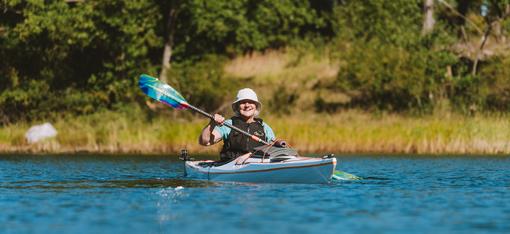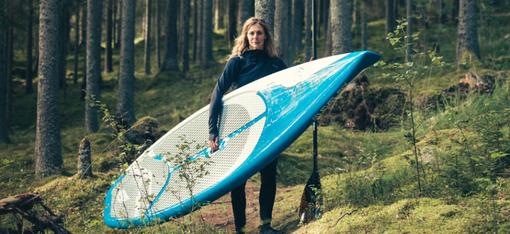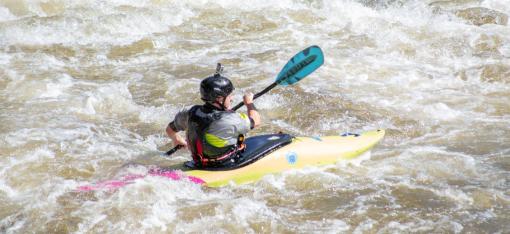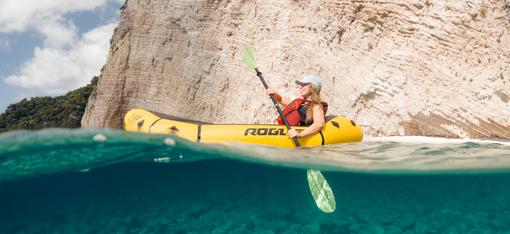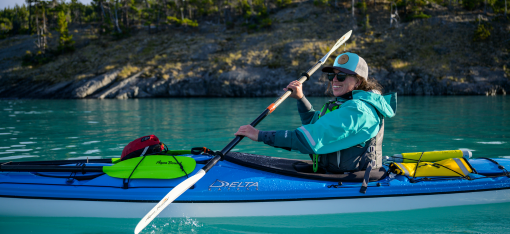A Paddler's Guide to Leaving No Trace
There are few things out there as memorable or rewarding as an overnight river trip. It doesn't matter the river type—whether it's full of technical rapids or deep, languid flat water—there's just something about paddling to a campsite that can't be beaten.
But of course with all good things, it pays to be diligent and responsible in order to keep them good. So, here are some simple ways to minimize your impacts while paddling, so that you (and others) can enjoy these natural places for many more trips to come.
Plan Ahead and Prepare
- Learn about river-specific issues, regulations, and permits.
- Use a river guidebook and map to plan your trip.
- Schedule your trip so that you encounter appropriate river flows for your group’s ability.
- Prepare for extreme weather, hazards, and emergencies.
- Schedule your trip to avoid times of high use; visit in small groups.
- Repackage food to minimize waste.
- Know river skills and carry the necessary equipment to minimize your impact.
Travel and Camp on Durable Surfaces
- Durable surfaces include rock, gravel, and sand.
- Focus activity where vegetation is absent.
- Concentrate use on existing trails and campsites.
- Select a campsite large enough for your group.
- When on day hikes in the river corridor, walk single file in the middle of the trail, even when muddy.
- In pristine areas, disperse use to prevent creation of new campsites and trails.
- Leave campsites clean and natural looking.
Dispose of Waste Properly
- Pack it in, pack it out.
- Use a washable, reusable toilet or other approved method to pack out human waste, toilet paper and tampons. Check local regulations.
- Liquid wastes can be dumped into main current in many high volume (over 500 cfs) rivers. In low volume rivers, scatter liquid waste 200ft from water, away from camp and trails. Check local regulations.
- Urinating directly into the river is often the best option. Check local regulations.
- Use a tarp in the kitchen to catch food and trash, which attract unwanted animals.
- Pack out all small food particles and small pieces of trash.
Leave What You Find
- Appreciate ancient structures, artifacts, rock art and other natural objects, but leave them undisturbed.
- Do not build structures or dig trenches in campsites.
- Avoid introducing non-native species, including live bait, by cleaning equipment between trips.
Minimize Campfire Impacts
- Minimize campfire impacts by using stoves.
- Use a fire pan or designated fire ring for open fires and charcoal.
- Elevate fire pan and use a fire blanket to catch embers.
- Use dead and downed wood no larger than an adult’s wrist to keep the fire small.
- Consider bringing your own firewood or charcoal.
- Burn all wood and charcoal to ash. Carry out ash with other garbage.
Respect Wildlife
- Observe wildlife from a distance. Do not follow or approach them.
- Never feed wildlife; it damages their health, alters natural behaviors, and exposes them to predators and other dangers.
- Protect wildlife by storing food and trash securely.
- Control pets or leave them at home.
- Avoid wildlife during sensitive times: mating, nesting, or when food is scarce.
Be Considerate of Other Visitors
- Respect other visitors and protect the quality of their experience.
- Communicate with other river visitors about your floating and camping plans.
- Leave larger camps for larger groups.
- Avoid camping or eating near major rapids where scouting and portaging take place.
- Non-motorized crafts usually have right-of-way over powerboats; slower boats should keep to the right.
- Let nature’s sounds prevail.
Following these principles will help protect and conserve our rivers. For more information on Leave No Trace, please visit www.LNT.org.
Mission: The Leave No Trace Center for Outdoor Ethics teaches people how to enjoy the outdoors responsibly.
About the Leave No Trace Center for Outdoor Ethics: The member-driven Leave No Trace Center for Outdoor Ethics teaches people of all ages how to enjoy the outdoors responsibly, and is the most widely accepted outdoor ethics program used on public lands. As the leader in sustainable recreation practices, the Center is training a nation of outdoor advocates to put Leave No Trace principles into action. Through relevant and targeted education, research and outreach, the Center will ensure the long-term health of our natural world.
(Originally written by RootsRated)
Let us know your paddling questions! Contact our Wisconsin-based Customer Service team today: 715-755-3405 • sales@aquabound.com
More for you...
- Kayaking the Rideau Canal in Ottawa, Ontario
- 15 Amazing National Parks to Kayak in the US & Canada
- How to Self-Rescue if You Capsize [Video]

